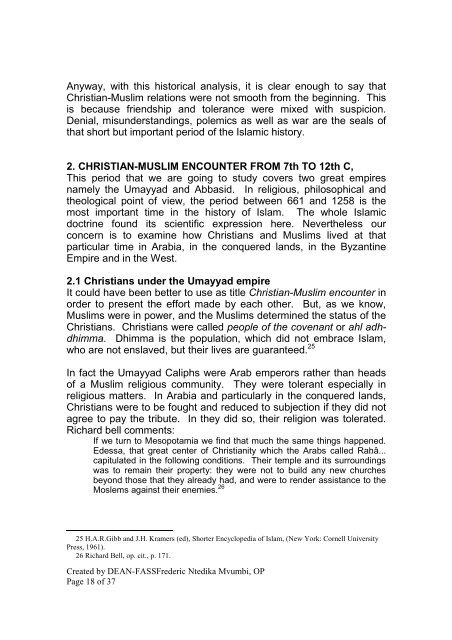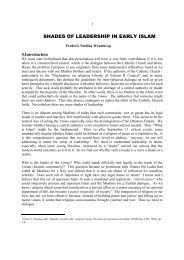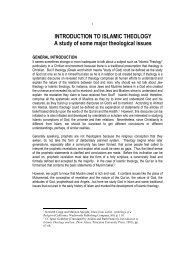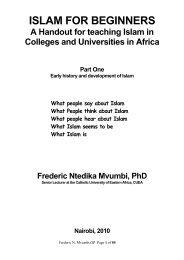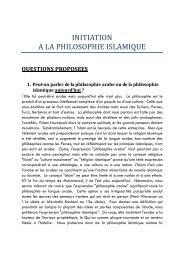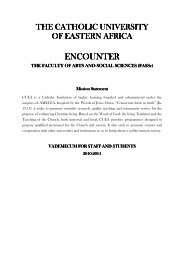PRINCIPLES FOR INTERRELIGIOUS DIALOGUE.pdf - CUEA
PRINCIPLES FOR INTERRELIGIOUS DIALOGUE.pdf - CUEA
PRINCIPLES FOR INTERRELIGIOUS DIALOGUE.pdf - CUEA
You also want an ePaper? Increase the reach of your titles
YUMPU automatically turns print PDFs into web optimized ePapers that Google loves.
Anyway, with this historical analysis, it is clear enough to say that<br />
Christian-Muslim relations were not smooth from the beginning. This<br />
is because friendship and tolerance were mixed with suspicion.<br />
Denial, misunderstandings, polemics as well as war are the seals of<br />
that short but important period of the Islamic history.<br />
2. CHRISTIAN-MUSLIM ENCOUNTER FROM 7th TO 12th C,<br />
This period that we are going to study covers two great empires<br />
namely the Umayyad and Abbasid. In religious, philosophical and<br />
theological point of view, the period between 661 and 1258 is the<br />
most important time in the history of Islam. The whole Islamic<br />
doctrine found its scientific expression here. Nevertheless our<br />
concern is to examine how Christians and Muslims lived at that<br />
particular time in Arabia, in the conquered lands, in the Byzantine<br />
Empire and in the West.<br />
2.1 Christians under the Umayyad empire<br />
It could have been better to use as title Christian-Muslim encounter in<br />
order to present the effort made by each other. But, as we know,<br />
Muslims were in power, and the Muslims determined the status of the<br />
Christians. Christians were called people of the covenant or ahl adhdhimma.<br />
Dhimma is the population, which did not embrace Islam,<br />
who are not enslaved, but their lives are guaranteed. 25<br />
In fact the Umayyad Caliphs were Arab emperors rather than heads<br />
of a Muslim religious community. They were tolerant especially in<br />
religious matters. In Arabia and particularly in the conquered lands,<br />
Christians were to be fought and reduced to subjection if they did not<br />
agree to pay the tribute. In they did so, their religion was tolerated.<br />
Richard bell comments:<br />
If we turn to Mesopotamia we find that much the same things happened.<br />
Edessa, that great center of Christianity which the Arabs called Ra .hâ...<br />
capitulated in the following conditions. Their temple and its surroundings<br />
was to remain their property: they were not to build any new churches<br />
beyond those that they already had, and were to render assistance to the<br />
Moslems against their enemies. 26<br />
25 H.A.R.Gibb and J.H. Kramers (ed), Shorter Encyclopedia of Islam, (New York: Cornell University<br />
Press, 1961).<br />
26 Richard Bell, op. cit., p. 171.<br />
Created by DEAN-FASSFrederic Ntedika Mvumbi, OP<br />
Page 18 of 37


